牛津译林版(2019)必修 第三册Unit 4 Scientists who changed the world Extended reading课件(共31张PPT)
文档属性
| 名称 | 牛津译林版(2019)必修 第三册Unit 4 Scientists who changed the world Extended reading课件(共31张PPT) | 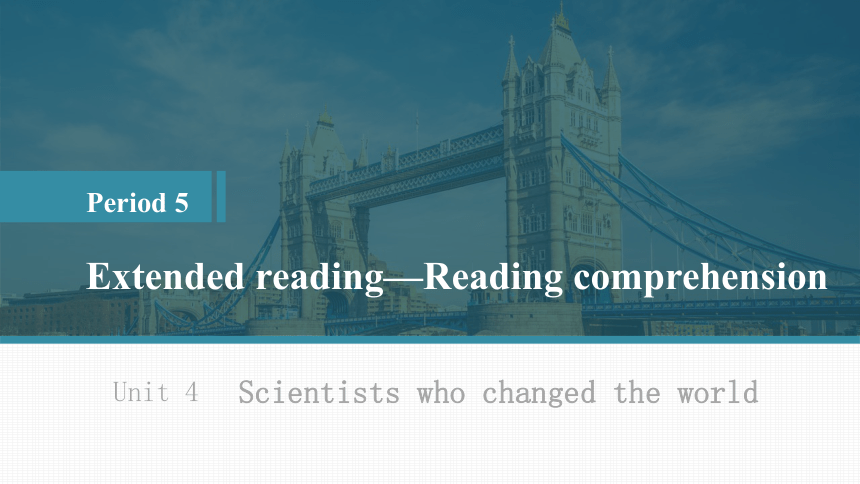 | |
| 格式 | pptx | ||
| 文件大小 | 5.5MB | ||
| 资源类型 | 教案 | ||
| 版本资源 | 牛津译林版(2019) | ||
| 科目 | 英语 | ||
| 更新时间 | 2024-03-02 16:13:12 | ||
图片预览

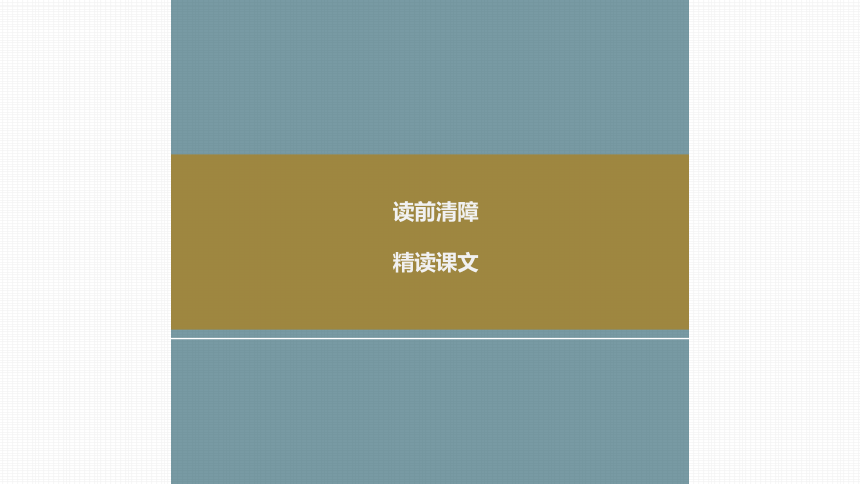

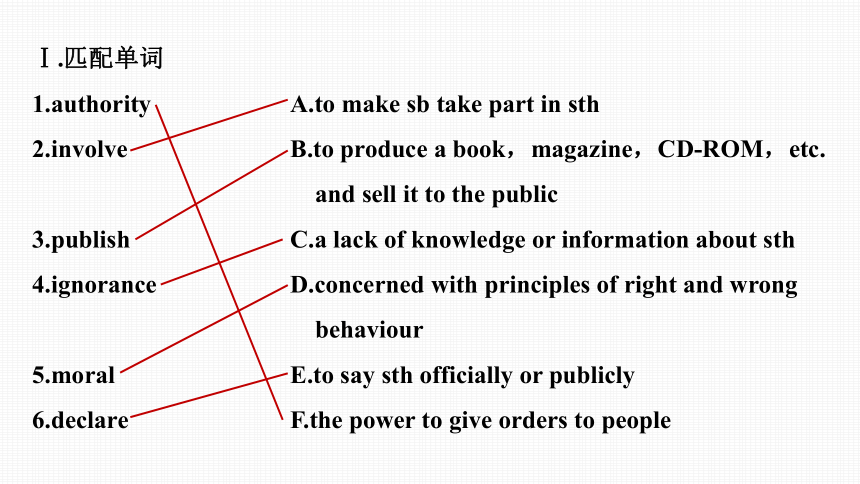
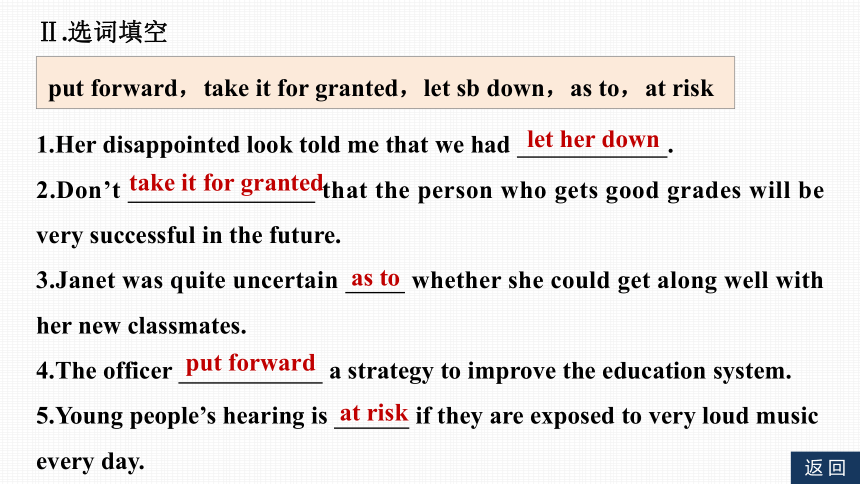

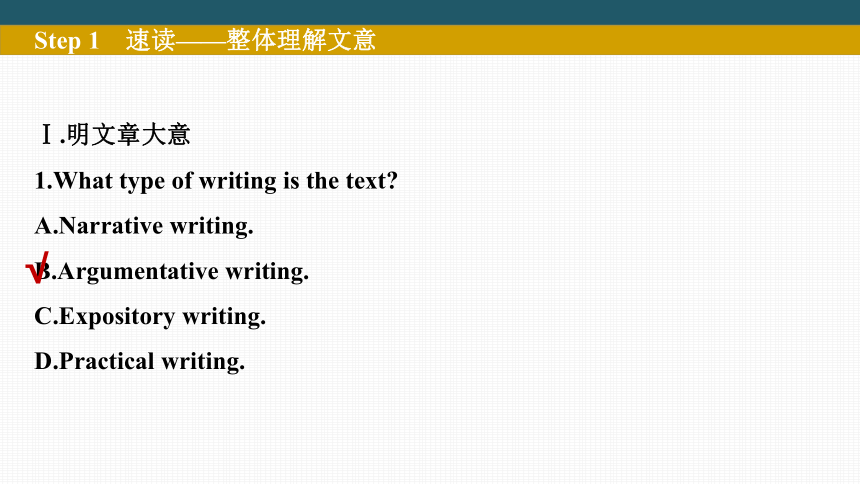
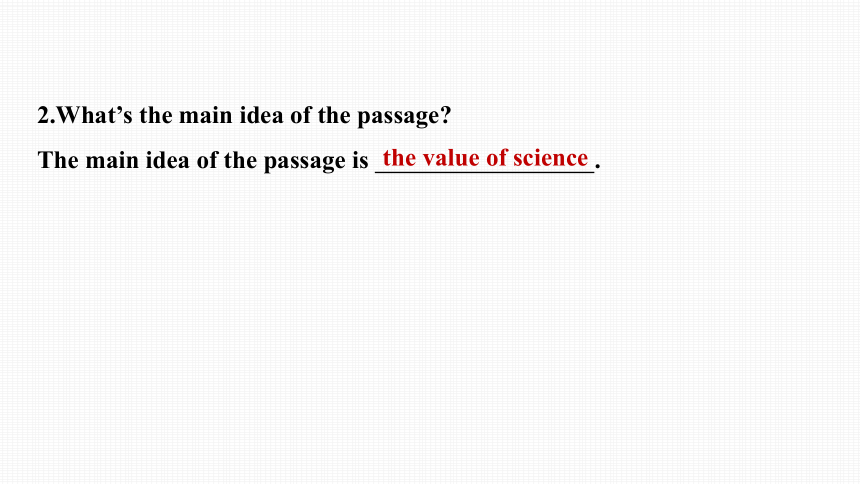

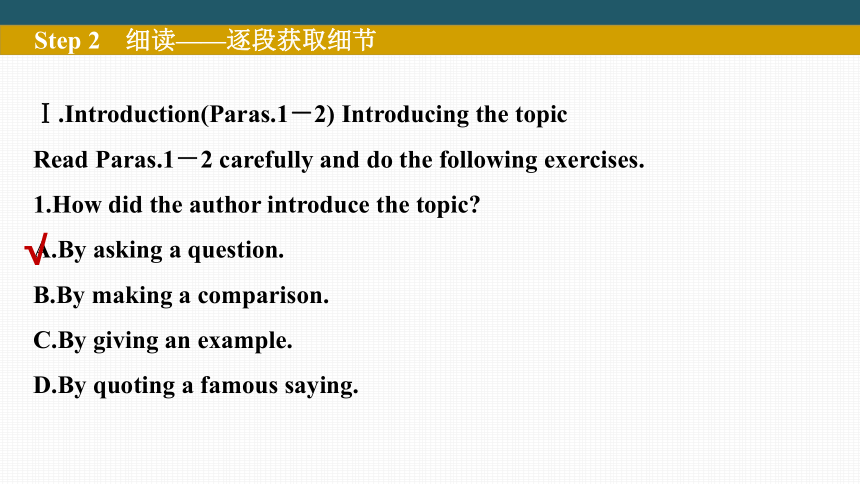
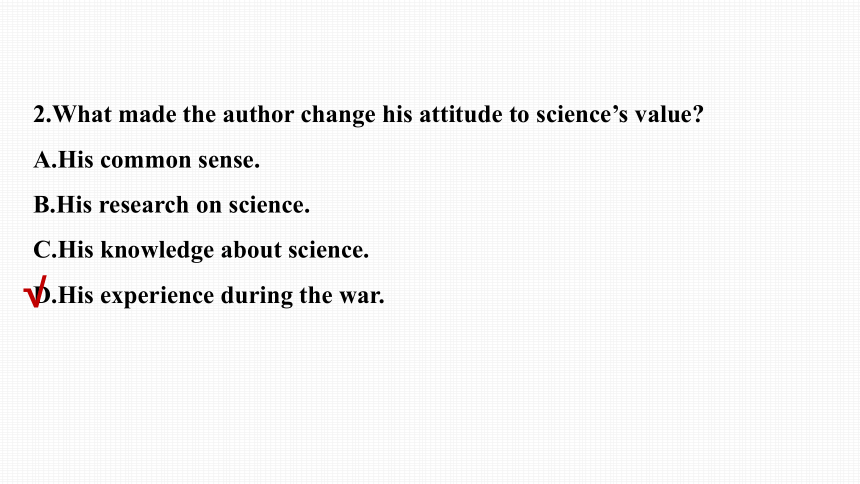
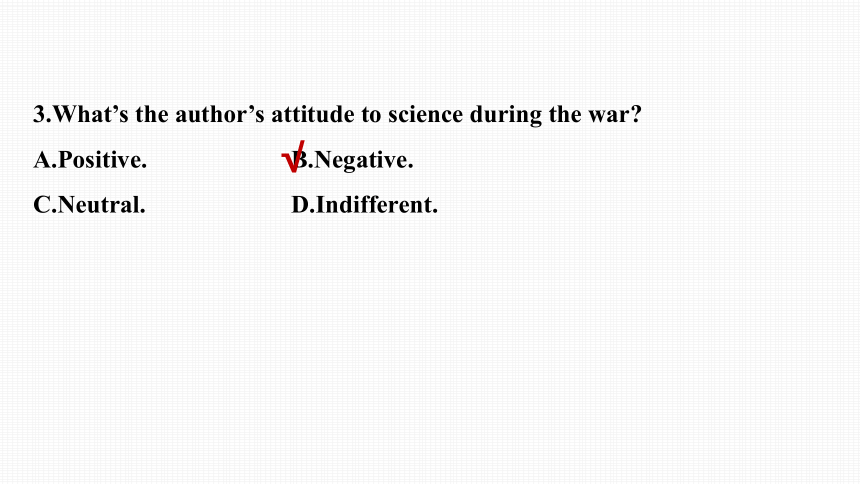
文档简介
(共31张PPT)
Period 5
Extended reading—Reading comprehension
Unit 4
Scientists who changed the world
读前清障
精读课文
读前 清障
Ⅰ.匹配单词
1.authority A.to make sb take part in sth
2.involve B.to produce a book,magazine,CD-ROM,etc.
and sell it to the public
3.publish C.a lack of knowledge or information about sth
4.ignorance D.concerned with principles of right and wrong
behaviour
5.moral E.to say sth officially or publicly
6.declare F.the power to give orders to people
1.Her disappointed look told me that we had .
2.Don’t that the person who gets good grades will be very successful in the future.
3.Janet was quite uncertain whether she could get along well with her new classmates.
4.The officer a strategy to improve the education system.
5.Young people’s hearing is if they are exposed to very loud music every day.
Ⅱ.选词填空
put forward,take it for granted,let sb down,as to,at risk
返 回
let her down
take it for granted
as to
put forward
at risk
精读 课文
Ⅰ.明文章大意
1.What type of writing is the text
A.Narrative writing.
B.Argumentative writing.
C.Expository writing.
D.Practical writing.
Step 1 速读——整体理解文意
√
2.What’s the main idea of the passage
The main idea of the passage is .
the value of science
Ⅱ.悉层次结构
Skim the text and get the main idea of each part.
Part 1(Paras.1-2): .
Part 2(Paras.3-6): .
Part 3(Para.7): .
Introducing the topic
The value of science
Duties of scientists
Ⅰ.Introduction(Paras.1-2) Introducing the topic
Read Paras.1-2 carefully and do the following exercises.
1.How did the author introduce the topic
A.By asking a question.
B.By making a comparison.
C.By giving an example.
D.By quoting a famous saying.
Step 2 细读——逐段获取细节
√
2.What made the author change his attitude to science’s value
A.His common sense.
B.His research on science.
C.His knowledge about science.
D.His experience during the war.
√
3.What’s the author’s attitude to science during the war
A.Positive. B.Negative.
C.Neutral. D.Indifferent.
√
Ⅱ.Main body(Paras.3-6) The value of science
Read Paras.3-6 carefully and do the following exercises.
1.Summarize 3 points of the value of science.
Para.3:The first value:_________________________________________
_______________________________________________________________
Para.4:Another value:_________________________________________
Paras.5-6:The third value:____________________________________
Scientific knowledge enables us to do and make
all things.
It can provide the intellectual enjoyment.
Scientists should have the freedom to doubt.
2.What can we learn from the third paragraph
A.Scientific knowledge always enables us to do good things.
B.Scientific knowledge always enables us to do bad things.
C.Scientific knowledge enables us to do good things or bad things.
D.Scientific knowledge always tells us how to apply it.
√
3.According to Feynman,who should be blamed if the power of science is used to do something bad
答案 It is not the science,but the man misusing it that should be blamed.
4.What does “it” in the following sentences refer to Choose the best answer.
Of course,if we make good things,① it is not only to the credit science;②it also to the credit of the moral choice which let us to good work.Scientific knowledge is an enabling power to do either good or bad—but ③it does not carry instructions on how to apply ④it.Such power has obvious value—even though the power may be negated by what one does with ⑤it.
A.making good things B.an enabling power
C.scientific knowledge D.the first way
答案 ①② A ③④⑤ C
5.What does intellectual enjoyment include Find out words or phrases positive in meaning.
答案 Feel the excitement and mystery;more wonderful mystery;inspiring;with pleasure and confidence;wonderful questions and mysteries;fantastic.
6.What does “the intellectual enjoyment” mean according to Richard
A.Science is great fun and people take delight in learning science.
B.Science is complex and can help people become clever.
C.Science is unlimited and people get pleasure from making constant
discoveries.
D.Science is developing and people enjoy the ever-changing scientific
knowledge.
√
7.What are the steps about scientists’ figuring out problems
答案 Problem:ignorant;idea:uncertain;result:doubtful.
Ⅲ.Conclusion(Para.7)
Read Para.7 and do the following exercises.
1.What are the duties of scientists
答案 To declare the value of the freedom to doubt.
To teach how doubt is not to be feared but to be welcomed and discussed.
To demand this freedom to all coming generations.
2.What can we infer from the passage
A.Everything has two sides.
B.All is progressing.
C.Authority is science.
D.Science can change everything.
√
3.What is the purpose of the text
A.To comfort worried people.
B.To show the author’s excellent talents to people.
C.To respect famous scientists.
D.To tell people the importance of science.
√
1.Feynman believes that of all science’s many values,the greatest must be the freedom to doubt.How do you understand this?(Critical thinking)
2.How do you understand the famous saying,“Science is a double-edged sword”?(Divergent thinking)
Step 3 读后——讨论深度理解
When the author was younger,he thought science was 1._________ (obvious) useful.But during the war,it represented the 2.___________(destroy) of people.“Is there some evil 3. (involve) in science?”The author asked himself.
Science has many 4. (value).The first way 5. which science is of value is familiar to us—6. (enable) us to do and make all kinds of things.Another value is the intellectual enjoyment it can provide us with.The third is the freedom to doubt,7. is born out of a deep and strong struggle against authority.
Step 4 总结——课文语法填空
obviously
destruction
involved
values
in
enabling
which
But scientists take 8. for granted that it is perfectly possible to live and not know.9. (teach) how doubt is not to be feared but to be welcomed and discussed,and to demand the freedom for all coming generations are scientists’ 10. (responsible).
it
To teach
responsibilities
Step 5 解读——长句难句分析
1.Put another way,what is the value of the science I had long devoted myself to—the thing I had loved—when I saw what terrible things it could do
[句式分析] 本句是 句。句子主句是what is the value of the science...;句中when引导 从句,从句含有一个what引导的 从句;句中I had long devoted myself to为省略了关系代词 的 从句,修饰先行词 ;I had loved为省略了关系代词 的 从句,修饰先行词 。名词短语the thing I had loved作名词science的 。
[自主翻译] ________________________________________________________
___________________________________________________________________
时间状语
主从复合
that/which
宾语
定语
science
that/which
定语
thing
同位语
换言之,在我发现科学可能造成的恶果之后,我一直投身其中的科学,我曾经的挚爱,价值何在?
2.Of course,if we make good things,it is not only to the credit of science;it is also to the credit of the moral choice which led us to good work.
[句式分析] 本句是 句。句中if引导 从句;主句中包含了 结构;which引导 从句,修饰先行词 。
[自主翻译] ______________________________________________________
_________________________________________________________________
主从复合
条件状语
not only...(but) also...
当然,如果我们做了好事,不仅归功于科学,还归功于引导我们行善的道德选择。
定语
choice
3.When he has an idea as to what the result is,he is uncertain.
[句式分析] 本句是 句。其中when引导 从句,what引导的 从句作介词短语as to的 。
[自主翻译] ___________________________________________________
主从复合
宾语
当他对于结果是什么有主意时,他是不确定的。
宾语
时间状语
4.Now,we scientists take it for granted that it is perfectly possible to live and not know.
[句式分析] 本句为 句。句中第一个it作 ,that引导的从句作 ;第二个it作 ,不定式to live and not know作 。
[自主翻译] ___________________________________________________
_______________________________________________________________
主从复合
形式宾语
真正的宾语
如今,我们科学家理所当然地认为,生而有所不知是完全有可能的。
形式主语
真正的主语
5.It is our responsibility as scientists,knowing the great progress that is the fruit of freedom of thought,to declare the value of this freedom;to teach how doubt is not to be feared but to be welcomed and discussed;and to demand this freedom as our duty to all coming generations.
[句式分析] 本句中It是 ,to declare...,to teach...,to demand...三个并列的不定式短语是 ;此处knowing the great progress that is the fruit of freedom of thought为动词-ing短语作 ,其中that引导 从句。
[自主翻译] ________________________________________________________
________________________________________________________________________________________________________________________________________
形式主语
真正的主语
状语
定语
作为科学家,我们明白巨大进步源于思想自由,因此,我们有责任阐明这种自由的价值;我们有责任教导人们怀疑不可怕,它值得欢迎和探讨;我们更有责任强烈要求拥有这一自由,这就是我们对后世的义务。
返 回
本课结束
Period 5
Extended reading—Reading comprehension
Unit 4
Scientists who changed the world
读前清障
精读课文
读前 清障
Ⅰ.匹配单词
1.authority A.to make sb take part in sth
2.involve B.to produce a book,magazine,CD-ROM,etc.
and sell it to the public
3.publish C.a lack of knowledge or information about sth
4.ignorance D.concerned with principles of right and wrong
behaviour
5.moral E.to say sth officially or publicly
6.declare F.the power to give orders to people
1.Her disappointed look told me that we had .
2.Don’t that the person who gets good grades will be very successful in the future.
3.Janet was quite uncertain whether she could get along well with her new classmates.
4.The officer a strategy to improve the education system.
5.Young people’s hearing is if they are exposed to very loud music every day.
Ⅱ.选词填空
put forward,take it for granted,let sb down,as to,at risk
返 回
let her down
take it for granted
as to
put forward
at risk
精读 课文
Ⅰ.明文章大意
1.What type of writing is the text
A.Narrative writing.
B.Argumentative writing.
C.Expository writing.
D.Practical writing.
Step 1 速读——整体理解文意
√
2.What’s the main idea of the passage
The main idea of the passage is .
the value of science
Ⅱ.悉层次结构
Skim the text and get the main idea of each part.
Part 1(Paras.1-2): .
Part 2(Paras.3-6): .
Part 3(Para.7): .
Introducing the topic
The value of science
Duties of scientists
Ⅰ.Introduction(Paras.1-2) Introducing the topic
Read Paras.1-2 carefully and do the following exercises.
1.How did the author introduce the topic
A.By asking a question.
B.By making a comparison.
C.By giving an example.
D.By quoting a famous saying.
Step 2 细读——逐段获取细节
√
2.What made the author change his attitude to science’s value
A.His common sense.
B.His research on science.
C.His knowledge about science.
D.His experience during the war.
√
3.What’s the author’s attitude to science during the war
A.Positive. B.Negative.
C.Neutral. D.Indifferent.
√
Ⅱ.Main body(Paras.3-6) The value of science
Read Paras.3-6 carefully and do the following exercises.
1.Summarize 3 points of the value of science.
Para.3:The first value:_________________________________________
_______________________________________________________________
Para.4:Another value:_________________________________________
Paras.5-6:The third value:____________________________________
Scientific knowledge enables us to do and make
all things.
It can provide the intellectual enjoyment.
Scientists should have the freedom to doubt.
2.What can we learn from the third paragraph
A.Scientific knowledge always enables us to do good things.
B.Scientific knowledge always enables us to do bad things.
C.Scientific knowledge enables us to do good things or bad things.
D.Scientific knowledge always tells us how to apply it.
√
3.According to Feynman,who should be blamed if the power of science is used to do something bad
答案 It is not the science,but the man misusing it that should be blamed.
4.What does “it” in the following sentences refer to Choose the best answer.
Of course,if we make good things,① it is not only to the credit science;②it also to the credit of the moral choice which let us to good work.Scientific knowledge is an enabling power to do either good or bad—but ③it does not carry instructions on how to apply ④it.Such power has obvious value—even though the power may be negated by what one does with ⑤it.
A.making good things B.an enabling power
C.scientific knowledge D.the first way
答案 ①② A ③④⑤ C
5.What does intellectual enjoyment include Find out words or phrases positive in meaning.
答案 Feel the excitement and mystery;more wonderful mystery;inspiring;with pleasure and confidence;wonderful questions and mysteries;fantastic.
6.What does “the intellectual enjoyment” mean according to Richard
A.Science is great fun and people take delight in learning science.
B.Science is complex and can help people become clever.
C.Science is unlimited and people get pleasure from making constant
discoveries.
D.Science is developing and people enjoy the ever-changing scientific
knowledge.
√
7.What are the steps about scientists’ figuring out problems
答案 Problem:ignorant;idea:uncertain;result:doubtful.
Ⅲ.Conclusion(Para.7)
Read Para.7 and do the following exercises.
1.What are the duties of scientists
答案 To declare the value of the freedom to doubt.
To teach how doubt is not to be feared but to be welcomed and discussed.
To demand this freedom to all coming generations.
2.What can we infer from the passage
A.Everything has two sides.
B.All is progressing.
C.Authority is science.
D.Science can change everything.
√
3.What is the purpose of the text
A.To comfort worried people.
B.To show the author’s excellent talents to people.
C.To respect famous scientists.
D.To tell people the importance of science.
√
1.Feynman believes that of all science’s many values,the greatest must be the freedom to doubt.How do you understand this?(Critical thinking)
2.How do you understand the famous saying,“Science is a double-edged sword”?(Divergent thinking)
Step 3 读后——讨论深度理解
When the author was younger,he thought science was 1._________ (obvious) useful.But during the war,it represented the 2.___________(destroy) of people.“Is there some evil 3. (involve) in science?”The author asked himself.
Science has many 4. (value).The first way 5. which science is of value is familiar to us—6. (enable) us to do and make all kinds of things.Another value is the intellectual enjoyment it can provide us with.The third is the freedom to doubt,7. is born out of a deep and strong struggle against authority.
Step 4 总结——课文语法填空
obviously
destruction
involved
values
in
enabling
which
But scientists take 8. for granted that it is perfectly possible to live and not know.9. (teach) how doubt is not to be feared but to be welcomed and discussed,and to demand the freedom for all coming generations are scientists’ 10. (responsible).
it
To teach
responsibilities
Step 5 解读——长句难句分析
1.Put another way,what is the value of the science I had long devoted myself to—the thing I had loved—when I saw what terrible things it could do
[句式分析] 本句是 句。句子主句是what is the value of the science...;句中when引导 从句,从句含有一个what引导的 从句;句中I had long devoted myself to为省略了关系代词 的 从句,修饰先行词 ;I had loved为省略了关系代词 的 从句,修饰先行词 。名词短语the thing I had loved作名词science的 。
[自主翻译] ________________________________________________________
___________________________________________________________________
时间状语
主从复合
that/which
宾语
定语
science
that/which
定语
thing
同位语
换言之,在我发现科学可能造成的恶果之后,我一直投身其中的科学,我曾经的挚爱,价值何在?
2.Of course,if we make good things,it is not only to the credit of science;it is also to the credit of the moral choice which led us to good work.
[句式分析] 本句是 句。句中if引导 从句;主句中包含了 结构;which引导 从句,修饰先行词 。
[自主翻译] ______________________________________________________
_________________________________________________________________
主从复合
条件状语
not only...(but) also...
当然,如果我们做了好事,不仅归功于科学,还归功于引导我们行善的道德选择。
定语
choice
3.When he has an idea as to what the result is,he is uncertain.
[句式分析] 本句是 句。其中when引导 从句,what引导的 从句作介词短语as to的 。
[自主翻译] ___________________________________________________
主从复合
宾语
当他对于结果是什么有主意时,他是不确定的。
宾语
时间状语
4.Now,we scientists take it for granted that it is perfectly possible to live and not know.
[句式分析] 本句为 句。句中第一个it作 ,that引导的从句作 ;第二个it作 ,不定式to live and not know作 。
[自主翻译] ___________________________________________________
_______________________________________________________________
主从复合
形式宾语
真正的宾语
如今,我们科学家理所当然地认为,生而有所不知是完全有可能的。
形式主语
真正的主语
5.It is our responsibility as scientists,knowing the great progress that is the fruit of freedom of thought,to declare the value of this freedom;to teach how doubt is not to be feared but to be welcomed and discussed;and to demand this freedom as our duty to all coming generations.
[句式分析] 本句中It是 ,to declare...,to teach...,to demand...三个并列的不定式短语是 ;此处knowing the great progress that is the fruit of freedom of thought为动词-ing短语作 ,其中that引导 从句。
[自主翻译] ________________________________________________________
________________________________________________________________________________________________________________________________________
形式主语
真正的主语
状语
定语
作为科学家,我们明白巨大进步源于思想自由,因此,我们有责任阐明这种自由的价值;我们有责任教导人们怀疑不可怕,它值得欢迎和探讨;我们更有责任强烈要求拥有这一自由,这就是我们对后世的义务。
返 回
本课结束
同课章节目录
- Unit 1 Nature in the balance
- Welcome to the unit
- Reading
- Grammar and usage
- Integrated skills
- Extended reading
- Project
- Unit 2 Natural disasters
- Welcome to the unit
- Reading
- Grammar and usage
- Integrated skills
- Extended reading
- Project
- Unit 3 The world online
- Welcome to the unit
- Reading
- Grammar and usage
- Integrated skills
- Extended reading
- Project
- Unit 4 Scientists who changed the world
- Welcome to the unit
- Reading
- Grammar and usage
- Integrated skills
- Extended reading
- Project
